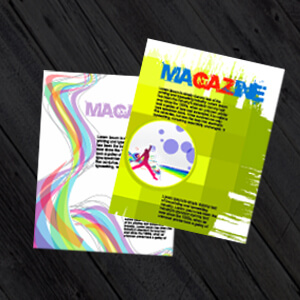Printing still holds significant importance for small business marketing, despite the digital age we live in. While online marketing strategies are essential, printed materials offer unique advantages that can complement and enhance overall marketing efforts. Here are some reasons why printing remains important for small business marketing:
- Tangibility: Printed materials provide a tangible and physical presence that digital marketing cannot replicate. Brochures, business cards, flyers, posters, and other printed materials allow potential customers to touch and feel your brand, creating a more memorable experience.
- Credibility and Trust: High-quality printed materials can convey a sense of professionalism and credibility. Well-designed and professionally printed materials can establish trust with potential customers and show that your business is serious about its brand image.
- Targeted Marketing: Printed materials can be strategically distributed to reach specific target audiences. For example, you can distribute flyers or brochures in local neighbourhoods or events where your target customers are likely to be present.
- Local Visibility: For small businesses that serve a specific local area, printed materials can help increase local visibility and attract nearby customers. This is particularly useful for businesses that rely on foot traffic or local clientele.
- Branding Opportunities: Printed materials offer excellent opportunities for branding. Consistent use of logos, colours, and design elements across different printed materials helps reinforce your brand identity and enhances brand recognition.
- Offline Reach: Not all potential customers are online all the time. Printed materials allow you to reach audiences who may not be as active on digital platforms, providing a well-rounded approach to marketing.
- Promotional Offers: Coupons, discounts, and special offers printed on flyers or direct mail can be an effective way to attract new customers and encourage repeat business.
- In-person Networking: Business cards remain a valuable tool for in-person networking events and meetings. Exchanging business cards is a professional way to make connections and ensure people have your contact information readily available.
- Longevity: Unlike digital marketing, printed materials can have a longer shelf life. People might keep brochures, business cards, or posters for future reference, potentially extending the impact of your marketing efforts.
- Personalisation: With advancements in printing technology, it’s easier than ever to personalise printed materials for individual customers or targeted groups. Personalised direct mail, for instance, can make recipients feel more valued and increase the chances of engagement.
In conclusion, while digital marketing has undoubtedly revolutionised the marketing landscape, printing still plays a crucial role in the marketing strategies of small businesses. Combining both digital and print marketing can help create a more comprehensive and effective approach to reaching and engaging with potential customers. PrintUK.com







.jpg)
.jpg)
